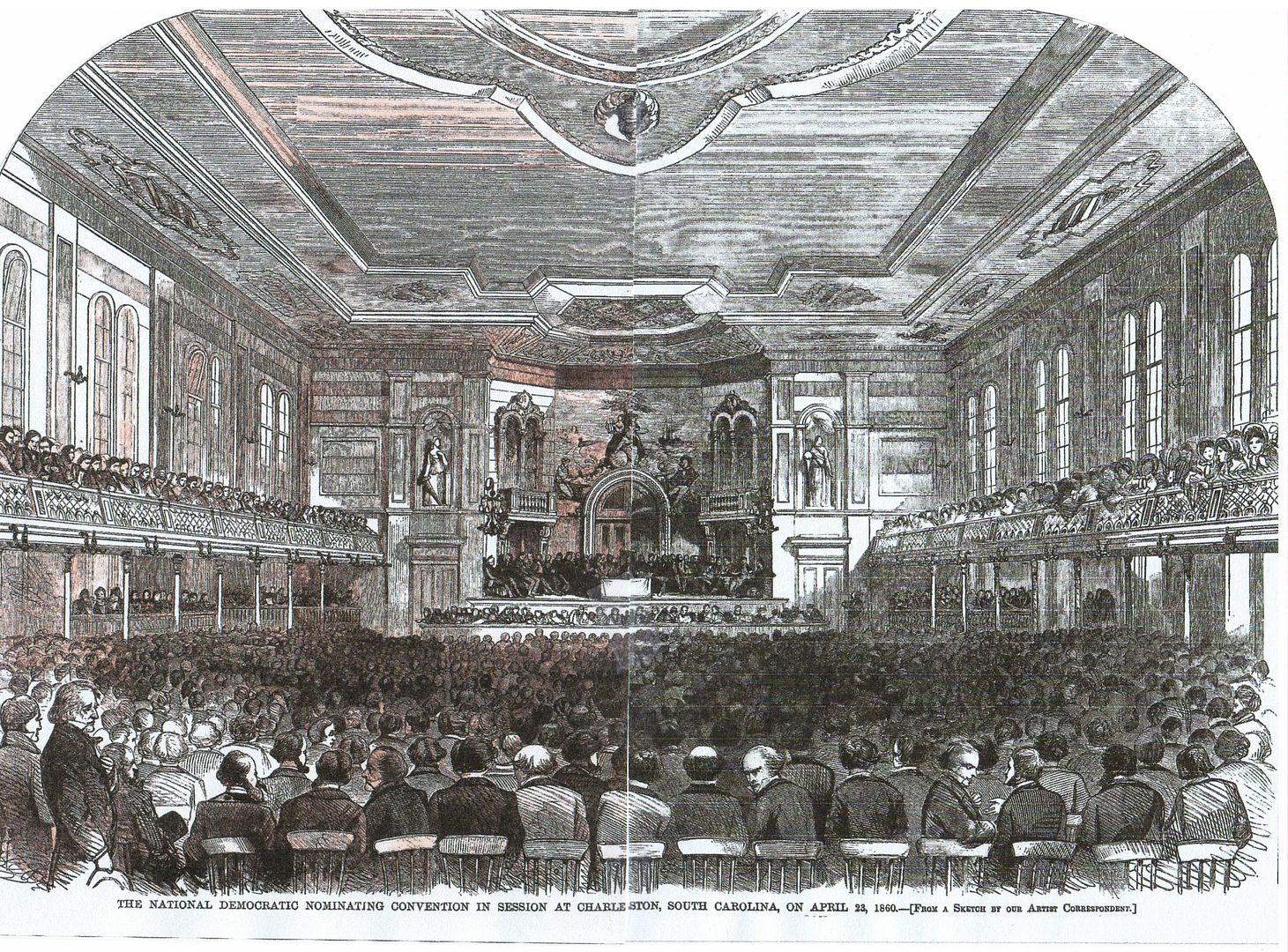
Free Republic University, Department of History presents U.S. History, 1855-1860: Seminar and Discussion Forum
Bleeding Kansas, Dred Scott, Lincoln-Douglas, Harper’s Ferry, the election of 1860, secession – all the events leading up to the Civil War, as seen through news reports of the time and later historical accounts
First session: November 21, 2015. Last date to add: Sometime in the future.
Reading: Self-assigned. Recommendations made and welcomed.
Posting history, in reverse order
To add this class to or drop it from your schedule notify Admissions and Records (Attn: Homer_J_Simpson) by reply or freepmail.
Link to previous thread
To: chajin; henkster; CougarGA7; BroJoeK; central_va; Larry Lucido; wagglebee; Colonel_Flagg; Amagi; ...
Charles Dickens’s New Serial – 1
A Night On the Ice – 1, 3
The Loss of the Steamship “Hungarian” – 2-3
Editorials – 3-4
The Lounger – 4-5
Humors of the Day – 5-6
The “Great Sea-Serpent” Found at Last – 6-7
Hon. John Sherman – 8-10
The Woman in White, by Wilkie Collins, Miss Halcombe’s Narrative Continued – 10-13
Domestic Intelligence – 13-14
Foreign News – 14-15
The Inauguration of Clark Mills’s Statue of Washington, on February 22, 1860 – 16-18
The Uncommercial Traveler. No II. By Charles Dickens – 19-20
Susa White’s Cosset – 20-22
The New Partner, or “Clingham & Co., Bankers, by Fitz Hugh Ludlow Chapter VIII continued – 22-24
The Legend of the Head of Bran – 24-25
The Mistress of the Parsonage, by Ela Rodman, Part III – 25-27
Late from the Nursery – 28
2 posted on
03/03/2020 5:03:06 AM PST by
Homer_J_Simpson
("Every nation gets the government that it deserves." - Joseph de Maistre (1753-1821))
To: chajin; henkster; CougarGA7; BroJoeK; central_va; Larry Lucido; wagglebee; Colonel_Flagg; Amagi; ...
Charles A. Dana to James S. Pike, March 3, 1860 NEW YORK, March 3.
MY DEAR PIKE: I reckon that rumor lies this time too. I don't know, of course; but I should need to have strong evidence to make me believe those letters were puffs for lobby use. However, if there is any proof let us have it.
I wish you would come back and go to work here again. Horace rather sweats under the toil, and cries for help now and then. You might as well stay here till the first of June as not.
Yours faithfully,
C. A. DANA.
SOURCE: James Shepherd Pike, First Blows of the Civil War: The Ten Years of Preliminary Conflict in the United States from 1850 to 1860, p. 500
civilwarnotebook.blogspot.com
Charles A. Dana Wikipedia page
3 posted on
03/03/2020 5:09:32 AM PST by
Homer_J_Simpson
("Every nation gets the government that it deserves." - Joseph de Maistre (1753-1821))
To: chajin; henkster; CougarGA7; BroJoeK; central_va; Larry Lucido; wagglebee; Colonel_Flagg; Amagi; ...
Continued from March 2
(reply #23).
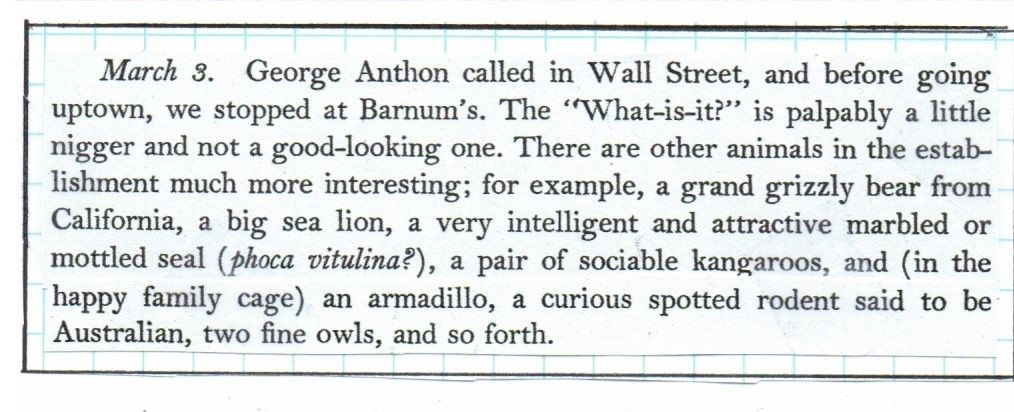
The Diary of George Templeton Strong, Edited by Allan Nevins and Milton Halsey Thomas
4 posted on
03/03/2020 5:11:35 AM PST by
Homer_J_Simpson
("Every nation gets the government that it deserves." - Joseph de Maistre (1753-1821))
To: Homer_J_Simpson
The week before in 1860, this happened:
Abraham Lincoln Spoke at Cooper’s Union
“Religion and good morals are the only solid foundation of public liberty
and happiness.” -—Samuel Adams
On February 27, 1860, Abraham Lincoln spoke at the Cooper Union in New York City.
This speech in many ways first showed Lincoln as a serious and viable candidate for the Republican presidential nomination in 1860. Originally scheduled to be given at Henry Ward Beecher's church, it was moved to the recently opened Cooper Union to accommodate a larger crowd.
It was the first in a series of speeches being sponsored by the opponents of New York Senator William H. Seward, who were anxiously searching for an alternative candidate for the Party's nomination. Many at the time stated it was “the pinnacle of his success” in lobbying for the Republican presidential nomination. It was given eight months before the election. The speech was lengthy, and carefully worded. Many concluded that it was a principled stand against the expansion of slavery. But most would miss the point entirely about why the speech was such a success before the large New York City audience of 1500.
It was a success because in the speech Lincoln pledged that the Republican Party would never interfere with southern slavery, thereby eliminating the prospect that large numbers of black people would live among New Yorkers and compete with them for jobs. Slavery’s “presence among us makes that toleration and protection [of slavery] a necessity,”
He stated that the country must keep slavery because it already existed in many states. All the constitutional guarantees of slavery should be “fully and fairly, maintained,” said “the great emancipator,” a line that drew a thunderous applause from the New Yorkers.
“It is a very great mistake to imagine that the object of loyalty is the authority and interest of one individual man, however dignified by the applause or enriched by the success of popular actions.” —Samuel Adams, Loyalty and Sedition, essay in The Advertiser, 1748
The crowd also cheered his support for the Republican Party’s opposition to the extension of slavery into the territories for the same reasons. Many northern whites wanted to keep slaves out of the West to keep blacks out. The North was a pervasively racist society where free blacks suffered social, economic, and political discrimination. Many northern voters sought to bar slaves from the West. This is another reason why New Yorkers cheered Lincoln’s Cooper Union speech. This, and the fact that they knew that he was also a lifelong advocate of “colonization” – of deporting all the free blacks in the U.S. to Africa, Haiti, and Central America.
“Here comes the orator! With his flood of words, and his drop of reason.” -—Benjamin Franklin
As a result of the speech and his visit to New York, notoriously crooked and corrupt New York/Tammany Hall political boss Thurlow Weed became the first to assist Lincoln in planning his presidential campaign.
“It is natural to man to indulge in the illusions of hope. We are apt to shut our eyes against a painful truth-—and listen to the song of that syren, till she transforms us into beasts.” -—Patrick Henry
* * * * * * * * * * * * * * *
5 posted on
03/03/2020 6:26:06 AM PST by
PeaRidge
To: chajin; henkster; CougarGA7; BroJoeK; central_va; Larry Lucido; wagglebee; Colonel_Flagg; Amagi; ...
Continued from February 27
(reply #9.)
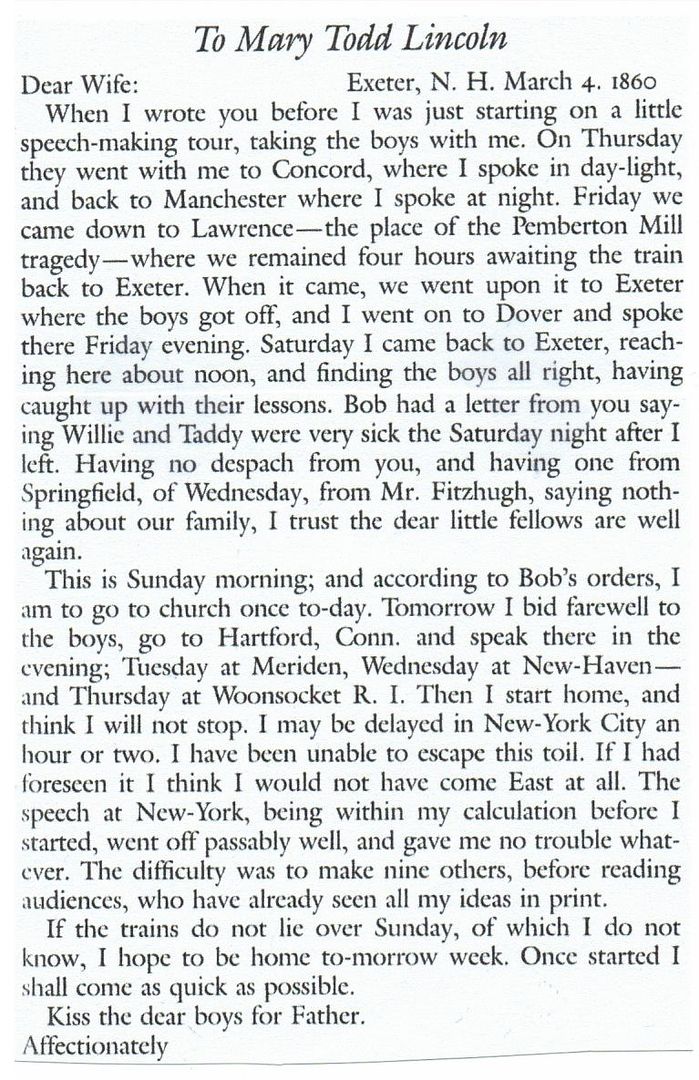
Abraham Lincoln: Speeches and Writings 1859-1865, edited by Don E. Fehrenbacher
7 posted on
03/04/2020 4:56:42 AM PST by
Homer_J_Simpson
("Every nation gets the government that it deserves." - Joseph de Maistre (1753-1821))
To: chajin; henkster; CougarGA7; BroJoeK; central_va; Larry Lucido; wagglebee; Colonel_Flagg; Amagi; ...
Horace Greeley to James S. Pike, March 4, 1860 NEW YORK, March 4,1860.
FRIEND PIKE: I don't happen to have that $10 to spare to-day; but I'll do the next best thing — I'll double the bet. Do you “take it”? You ought to be rejoiced to see your favorite phrase used grammatically for once.
Why don't you go in for having the printing done by the lowest bidder? There is no other way. When you see the Charleston convention in blast, you'll see stars. Then you'll see that the people are stronger than Washington City.
Yours,
HORACE GREELEY.
J. S. PIKE, ESQ.
SOURCE: James Shepherd Pike, First Blows of the Civil War: The Ten Years of Preliminary Conflict in the United States from 1850 to 1860, p. 500
civilwarnotebook.blogspot.com
8 posted on
03/04/2020 4:58:47 AM PST by
Homer_J_Simpson
("Every nation gets the government that it deserves." - Joseph de Maistre (1753-1821))
To: chajin; henkster; CougarGA7; BroJoeK; central_va; Larry Lucido; wagglebee; Colonel_Flagg; Amagi; ...
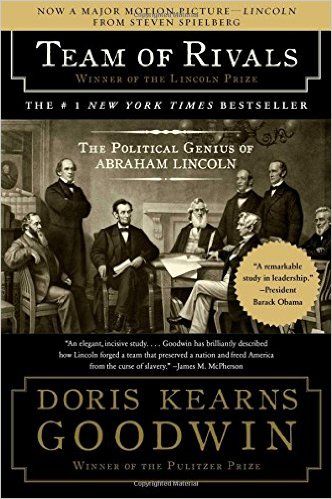
Continued from February 27 (reply #7).
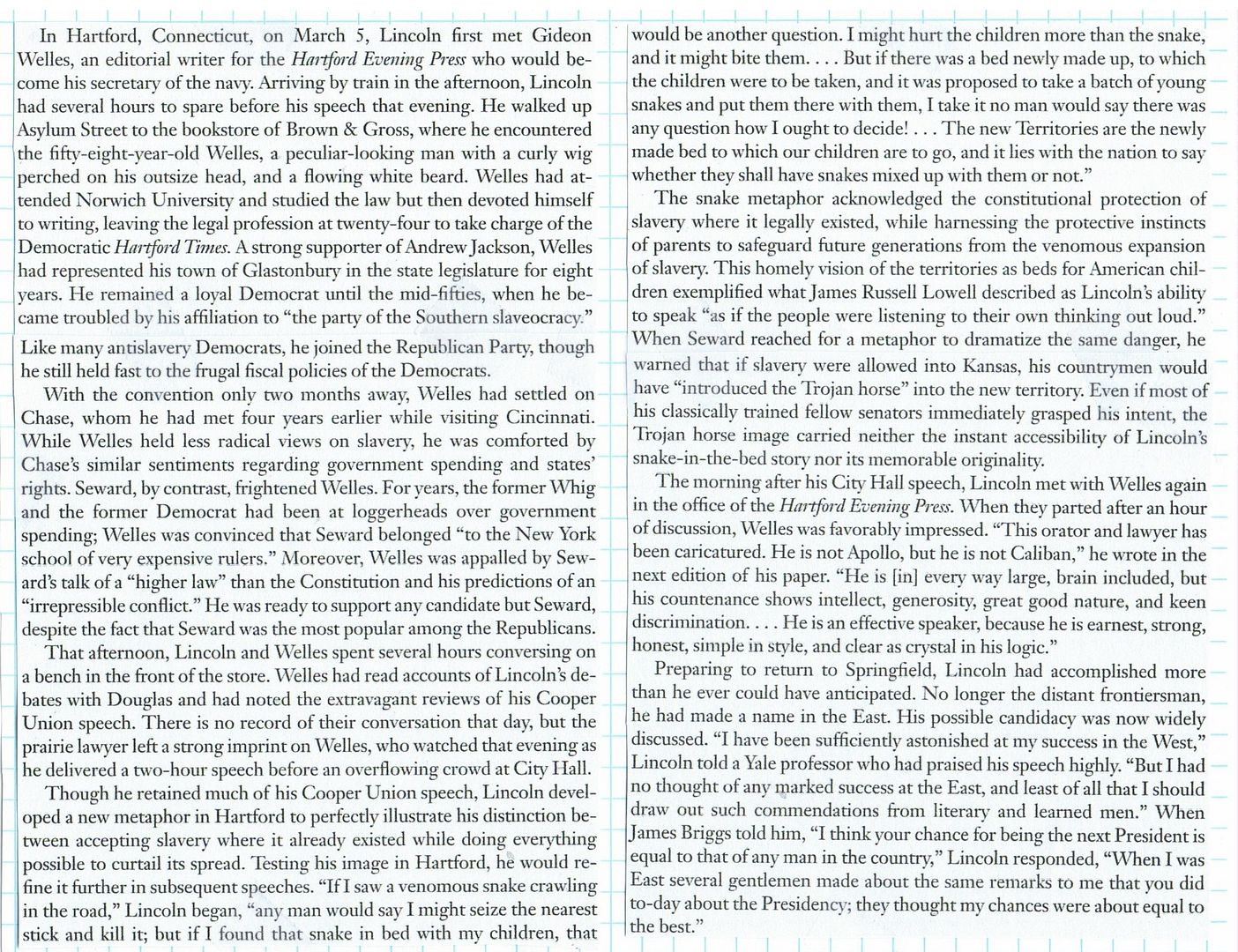
Doris Kearns Goodwin, Team of Rivals
10 posted on
03/05/2020 5:09:08 AM PST by
Homer_J_Simpson
("Every nation gets the government that it deserves." - Joseph de Maistre (1753-1821))
To: chajin; henkster; CougarGA7; BroJoeK; central_va; Larry Lucido; wagglebee; Colonel_Flagg; Amagi; ...
Horace Greeley to James S. Pike, March 5, 1860 NEW YORK, March 5, 1860.
FRIEND PIKE: Your grammar is perfect. The bet is all right — $20 to $20 on Douglas's nomination. Now if you want to go $20 more on Seward against the field for our nomination, I take that. I can spare the money, for I don't want to go to Chicago, and mean to keep away if possible.
If Douglas shall be nominated, I think Bates will have to be, unless we mean to rush on certain destruction. However, we shall see what we shall see.
“Capital States” and “Labor States” is foolish. Slave States and Free States tells the story, and no one can misunderstand it.
Why don't you go in hard for awarding the printing to the lowest bidder? I should be perfectly willing that Mrs. B. should have it all under that rule, if you can get it. Under the present system, I object. And a “National Printing Office” would be worse than this. Do try to help along some practical reform. I've written Sherman to send me a table of the mileage. Then we'll see who votes and how when that question comes up, and what they make or lose by it.
Yours,
HORACE GREELEY.
J. S. PIKE, Esq., Washington, D. C.
SOURCE: James Shepherd Pike, First Blows of the Civil War: The Ten Years of Preliminary Conflict in the United States from 1850 to 1860, p. 501
civilwarnotebook.blogspot.com
11 posted on
03/05/2020 5:11:07 AM PST by
Homer_J_Simpson
("Every nation gets the government that it deserves." - Joseph de Maistre (1753-1821))
To: Homer_J_Simpson
Please add me to your list.
16 posted on
03/07/2020 10:29:02 AM PST by
OIFVeteran
( "Liberty and Union, now and forever, one and inseparable!" Daniel Webster)
To: chajin; henkster; CougarGA7; BroJoeK; central_va; Larry Lucido; wagglebee; Colonel_Flagg; Amagi; ...
Charles A. Dana to James S. Pike, March 8, 1860 NEW YORK, March 8, 1860.
DEAR PIKE: Horace wants to go off in April, along between the 1st and the 10th, to be gone for a week or so, and I write to propose that you should get here by the 1st. He is going over Pennsylvania, and without your help we can't get along.
I have had a second letter from Hildreth. He is mending, and really writes in good spirits. I infer that he is going to get well.
The Seward stock is rising, and that will console some of our friends for the defeat of the city railroad schemes in Albany. George Law has beat all the other speculators, and got a bill through the Senate which looks like smothering the whole concern. It charters a road in the Seventh Avenue, with forty-eight branches running through every cross-street. The great political engineers are aghast at this triumph of their opponent. Perhaps they may beat him yet; but I doubt it.
Yours faithfully,
C. A. DANA.
SOURCE: James Shepherd Pike, First Blows of the Civil War: The Ten Years of Preliminary Conflict in the United States from 1850 to 1860, p. 501
civilwarnotebook.blogspot.com
Horace Greeley to James S. Pike, March 8, 1860
NEW YORK, March 8, 1860.
FRIEND PIKE: I have bet you $20 on Douglas against the field. So far good. Now you say Seward will be our man. Well, I offer you $20 on that. I name my man for Charleston and back him against the field. You name your man for Chicago, and don't back him against the field, as I proposed. Very good. It seems that I have more confidence in my jud[g]ment than you have in yours; so we will stand there on the original $20 on Douglas, which I trust you will win; only, if Douglas has no chance, you and Harvey should “poor pussy” him, not abuse him.
F. is one of the poorest and most debauched of the drunken sailors that floated ashore from the wreck of Know-Nothingism. He is, of course, the very man for a printer to Congress. No honest man could get it, for none of that stamp could lie enough. Hence Follett's failure in '56, and Defrees's now. Both these are honest men.
But Gurley's bill to establish a Government Printing-Office is worse even than Ford or Bowman or Wendell — worse than all three together. It is to establish a national hospital for broken-down editors and printers, the jackals of the Camerons, and Bankses and Brights and Gwinns of all time. It will be more expensive and more nauseous than any thing we have yet known. Every drunken printer and ex-editor who won't work, and can't earn a living if he would, will be billeted on the public Treasury, and jobs will be invented to keep up a semblance of work for them — and very little work will do them. Just see.
I hope F. will cheat the crowd out of every dollar. If he will do this with the impudence of a highwayman, I'll go in for giving him another as good thing somewhere. Genius should be encouraged.
Yours,
H. G.
J. S. P.
SOURCE: James Shepherd Pike, First Blows of the Civil War: The Ten Years of Preliminary Conflict in the United States from 1850 to 1860, p. 502
civilwarnotebook.blogspot.com
23 posted on
03/08/2020 2:27:36 PM PDT by
Homer_J_Simpson
("Every nation gets the government that it deserves." - Joseph de Maistre (1753-1821))
FreeRepublic.com is powered by software copyright 2000-2008 John Robinson




